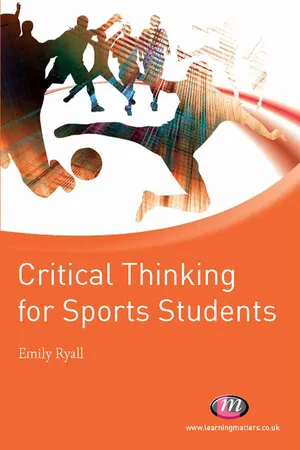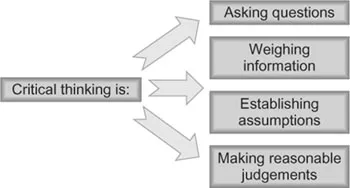![]()
Chapter 1
Critical thinking and the study of sport
Learning Objectives
This chapter will help you:
- define the concept of critical thinking;
- recognise some of the skills that critical thinking requires;
- understand why the ability to think critically is a valuable attribute;
- identify the relationship between critical thinking and the study of sport.
Introduction
How would you respond to the following statement?
The study of sport doesn’t require any great ability to think, does it? Surely it’s just about running around on artificial turf all day?
Would you:
a) Look at the speaker blankly and walk away?
b) Quietly and nervously reply, ‘yes, I suppose you’re right’?
c) Respond aggressively by saying, ‘you obviously don’t know anything about it then!’?
d) Enter willingly into a discussion about the academic integrity of undergraduate courses in sport?
If you answered a, b, or c to the above then you might need some persuasion that critical thinking has an important role to play in your studies. If you answered d, you may already be aware of the importance of thinking critically and your skills in this area may be reasonably developed. Either way, the purpose behind this book is to demonstrate the value of critical thought and to help you hone and consolidate the skills it requires.
What is critical thinking?
Essentially, the key to thinking critically is to: ask questions; decide what information is most accurate and relevant; establish what assumptions you are making; make reasonable and logical judgements; and be willing to subject all of your conclusions to yet more questioning (Figure 1.1).
Figure 1.1.
Learning Activity 1.1
Decide whether you already believe the following statements to be true or whether you would need further information before you could decide. Are they all the same types of statement? Provide a justification for your answer.
a) The Ukrainian Oleksandr Petriv broke the 25m rapid fire pistol shooting record in the Beijing 2008 Olympics.
b) Water polo is a sport.
c) Hitler attempted to use the 1936 Berlin Olympics as a vehicle to promote his Nazi ideology.
d) In 100 years time, Formula One racing will no longer exist.
e) Muscles require adenosine triphosphate to function.
f) Boxing should be taught as part of the PE curriculum in every secondary school.
Why is it so important to think critically?
The ability to think independently and critically is a key facet of higher education regardless of the subject you are studying. Developing the ability to think critically allows better informed and justified decisions to be made. Being able to provide clear and reasonable justification for the decisions you make and the action you subsequently take will provide you with credibility, influence, respect and, ultimately, the power to make more decisions and hold greater responsibility. Employers seeking graduates will often state essential criteria such as the ability to think critically, innovatively and independently. So improving your skills in this area will, at the very least, make you more employable. When employers advertise for applicants with a ‘keen eye for detail’, ‘an ability to communicate ideas clearly’ and ‘a passionate interest in this area’, they are essentially asking for the ability to think critically and to express ideas persuasively – key skills in almost any graduate-level job.
The ability to be critical is also part of what it means to be human. We are not creatures who react passively to our environment. We are able to reflect upon the way we live our life, the choices we make and the action we take as if detached observers. This unique ability is demonstrated in the use of imagery in sport and employed by sports psychologists to improve performance. The point of visualising an action as if a spectator and imagining the action performed effectively, i.e. a golf swing or kicking a ball, is to be able to reflect upon your movement and improve it. Furthermore, being able to imagine ourselves in various situations allows us to take all the knowledge and experience we have about the world and predict the future, or at least predict likely outcomes of particular courses of action. For instance, if I know that my opponent in my next tennis match likes to play from the baseline, then I can adjust my practice and game accordingly so as to take advantage of this. Ultimately, the best coaches are those who are able to think critically about the strengths and weaknesses of players and communicate this knowledge effectively.
So we could say that thought influences or directs behaviour. When we neglect to consider the consequences of our actions, we often later rue the fact that we didn’t ‘think’. In contrast, the ability we have to project our self into the future allows us to imagine the consequences of various courses of action and enables us to make informed decisions. When we act upon these decisions we are often expected to be able to justify and provide reasons for our actions. In this sense, thought is continuous with practice. One of the defining elements of higher education is to allow students to refine their critical thinking skills – to be willing and able to ask appropriate questions, to identify relevant and valid information, and to reach sound judgements.
Being able to think critically is also empowering. If we are able to think for ourselves then we are less subject to the control, whims and propaganda of others. The darker times in human history have been when people have acted without thinking critically about their beliefs, values and consequences. It is when people blindly follow others without questioning their arguments or motives that prejudice and suffering occurs. This is why it is not always easy to think critically (sometimes difficult and unpopular decisions need to be made) and why the moral virtues of courage and resolve are often required.
Critical thinking and moral courage
Sometimes the result of thinking critically leads to conclusions that may be difficult for us to act upon, especially if we have to defend ourselves in making unpopular decisions or make personal sacrifices. Sporting boycotts of politically sensitive events are a prime example of the times when individuals need to consider their own actions.
When Stuart MacGill, the Australian cricketer, decided not to make himself eligible for Australia’s tour to Zimbabwe in 2004, he took the decision after careful and considered deliberation. MacGill reasoned that it would not be morally justifiable for him to participate in a cricket match that took place in a country that he believed was suffering under malevolent leadership. MacGill could have kept his head down and maintained, as many others had done, that sport and politics should be kept separate and that he was simply paid to play cricket and not to make political comments. In refusing to make himself eligible for selection, MacGill’s place in the test side was forfeited, which could have had long-lasting effects on the rest of his career. Not only could MacGill have been accused of dissent against the cricketing authorities but also he would have to regain his selection for future tests. This was arguably an act of moral courage as, despite the consequences for himself, MacGill felt it necessary to take a publicised stand against the political situation in Zimbabwe. It was not a decision that MacGill took lightly; it was a decision reached after careful and considered thought, and one that he was confident in justifying to others.
Being able to think critically is a useful tool both to protect yourself against manipulation from others, to be a leader rather than a follower, and ultimately to have a role in creating the type of world in which you want to live. It is fundamentally necessary if we are to live up to our responsibilities as citizens in a human community.
Teach people to make good decisions and you equip them to improve their own futures and become contributing members of society, rather than burdens on society. Becoming educated and practicing good judgement does not absolutely guarantee a life of happiness, virtue, or economic success, but it surely offers a better chance at those things. And it is clearly better than enduring the consequences of making bad decisions and better than burdening friends, family, and all the rest of us with the unwanted and avoidable consequences of those poor choices.
(Facione, 2007, p1)
Learning Activity 1.2
a) Think of a time when you have had to make a difficult decision. What reasons made it difficult, what judgement did you make and how did you defend it?
b) Think of a time where you have been involved in a disagreement with someone else. Were you willing to argue your case, did you just enforce your position or did you end up blindly accepting the other’s point of view? With the benefit of hindsight, would there be anything that you would have changed about your actions?
Isn’t it just a matter of opinion?
On the way home from training, a team-mate comments, ‘I can’t believe Nicky wasn’t selected for the game this weekend.’ Another team-mate replies, ‘No, it was definitely the right decision to select Becky instead.’
One common mistake that many students make is to think that every opinion is equally valid. If this was the case, then you would have nothing further to say about Karen’s and Ally’s disagreement. Yet if it is your responsibility for selecting the team, there will be times when you have to make difficult decisions with which not everyone will agree. How well you are able to make and justify these decisions is dependent on your ability to think critically. If you are in a position of responsibility whereby you are expected to make judgements and decisions (which is a key aspect of graduate-level employment) then it simply isn’t possible to sit on the fence and maintain that it is just a matter of opinion.
I often see first-year undergraduates becoming exasperated with being constantly questioned about, and being asked to defend, their position on top...

